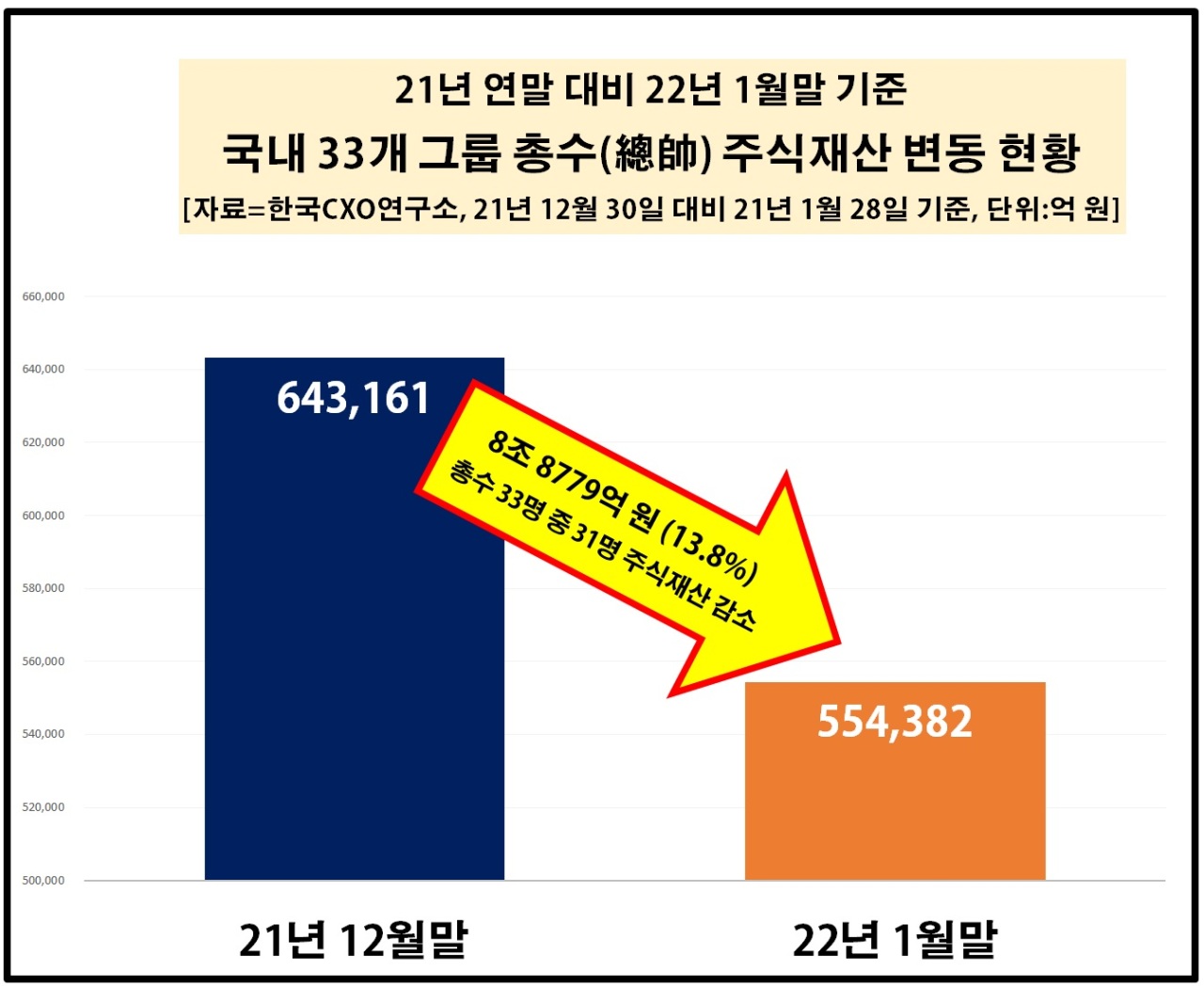Stock assets of chaebol leaders hit hard by Kospi loss
By Byun Hye-jinPublished : Feb. 7, 2022 - 15:56

The nation’s top chaebol leaders saw their stock assets fall sharply in January, as the nation’s benchmark Kospi entered a bear market, while some firms grappling with controversies also took a beating.
The total value of stocks owned by the nation’s top 33 chaebol owners was estimated at 55.43 trillion won ($46.19 billion) in January, down 13.8 percent from a month ago, according to data from market tracker Korea CXO Institute Monday.
Hyundai Development Co. Chairman Chung Mong-gyu, who recently stepped down from the post over two fatal accidents at its construction sites in Gwangju, saw the largest decrease among his fellow tycoons, with his stock assets falling 23.8 percent to 205 billion won.
Kakao Chairman Kim Beom-su came second, as his stock assets decreased 24.4 percent to 9.7 trillion won. The tech firm is still reeling from the recent massive sell-offs by some members of the top brass, angering minority investors.
Shares owned by Celltrion founder and Honorary Chairman Seo Jung-jin also plummeted 21.9 percent to 7.8 trillion won.
With the latest fall, Kakao’s Kim and Seo of Celltrion failed to stay on the so-called “10 trillion club,” a list of chaebol leaders whose stock assets exceed the 10 trillion-won mark. It leaves Samsung Electronics Vice Chairman Lee Jae-yong, who held 13.1 trillion won in shares, the sole member of the club.
Hyosung Group Chairman Cho Hyun-joon saw a 19.2 percent decrease in his shares to 930.8 billion won, while Naver’s co-founder and global investment officer, Lee Hae-jin, suffered an 18.1 percent drop to 1.9 trillion won.
“A downward trending market, coupled with controversial events related to the companies have tanked the stock shares owned by chaebol leaders. This also means that retail investors who had bought the company stocks have lost big,” said Oh Il-sun, head of Korea CXO Institute.
The total value of stocks owned by the nation’s top 33 chaebol owners was estimated at 55.43 trillion won ($46.19 billion) in January, down 13.8 percent from a month ago, according to data from market tracker Korea CXO Institute Monday.
Hyundai Development Co. Chairman Chung Mong-gyu, who recently stepped down from the post over two fatal accidents at its construction sites in Gwangju, saw the largest decrease among his fellow tycoons, with his stock assets falling 23.8 percent to 205 billion won.
Kakao Chairman Kim Beom-su came second, as his stock assets decreased 24.4 percent to 9.7 trillion won. The tech firm is still reeling from the recent massive sell-offs by some members of the top brass, angering minority investors.
Shares owned by Celltrion founder and Honorary Chairman Seo Jung-jin also plummeted 21.9 percent to 7.8 trillion won.
With the latest fall, Kakao’s Kim and Seo of Celltrion failed to stay on the so-called “10 trillion club,” a list of chaebol leaders whose stock assets exceed the 10 trillion-won mark. It leaves Samsung Electronics Vice Chairman Lee Jae-yong, who held 13.1 trillion won in shares, the sole member of the club.
Hyosung Group Chairman Cho Hyun-joon saw a 19.2 percent decrease in his shares to 930.8 billion won, while Naver’s co-founder and global investment officer, Lee Hae-jin, suffered an 18.1 percent drop to 1.9 trillion won.
“A downward trending market, coupled with controversial events related to the companies have tanked the stock shares owned by chaebol leaders. This also means that retail investors who had bought the company stocks have lost big,” said Oh Il-sun, head of Korea CXO Institute.




















![[Today’s K-pop] BTS pop-up event to come to Seoul](http://res.heraldm.com/phpwas/restmb_idxmake.php?idx=642&simg=/content/image/2024/04/17/20240417050734_0.jpg&u=)